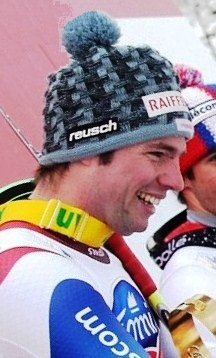This article includes a list of references, related reading, or external links, but its sources remain unclear because it lacks inline citations .(March 2020) |
| 1988 Men's Downhill World Cup | |
| Previous: 1987 | Next: 1989 |
Men's downhill World Cup 1987/1988
This article includes a list of references, related reading, or external links, but its sources remain unclear because it lacks inline citations .(March 2020) |
| 1988 Men's Downhill World Cup | |
| Previous: 1987 | Next: 1989 |
Men's downhill World Cup 1987/1988
In men's downhill World Cup 1987/88 all results count.
| Alpine skiing World Cup | |
| Men | |
| 1988 |

Downhill is a form of alpine skiing competition. Whereas the other alpine skiing events emphasize turning and technique, downhill emphasizes "the six components of technique, courage, speed, risk, physical condition and judgement", according to the FIS "International Ski Competition Rules (ICR)". Speeds of up to 130 km/h (81 mph) are common in international competition. Athletes must have an aerodynamically efficient tuck position to minimize drag and increase speed.

Super giant slalom, or super-G, is a racing discipline of alpine skiing. Along with the faster downhill, it is regarded as a "speed" event, in contrast to the technical events giant slalom and slalom. It debuted as an official World Cup event during the 1983 season and was added to the official schedule of the World Championships in 1987 and the Winter Olympics in 1988.

Alpine skiing has been contested at every Winter Olympics since 1936, when a combined event was held in Garmisch-Partenkirchen, Germany.
Combined is an event in alpine ski racing. The event format has changed within the last 30 years. A traditional combined competition is a two-day event consisting of one run of downhill and two runs of slalom; each discipline takes place on a separate day. The winner is the skier with the fastest aggregate time. Until the 1990s, a complicated point system was used to determine placings in the combined event. Since then, a modified version, called either a "super combined" or an "Alpine combined", has been run as an aggregate time event consisting of two runs: first, a one-run speed event and then only one run of slalom, with both portions held on the same day.
The 39th World Cup season began in October 2004 in Sölden, Austria, and concluded in March 2005 at the World Cup finals in Lenzerheide, Switzerland. The overall winners were Bode Miller of the U.S. and Anja Pärson of Sweden.
The 38th World Cup season began in October 2003 in Sölden, Austria, and concluded at the World Cup finals in Sestriere, Italy, in March 2004. Sestriere would host the alpine skiing events at the 2006 Winter Olympics.
The 22nd World Cup season began in November 1987 in Italy and concluded in March 1988 in Austria. The overall champions were Pirmin Zurbriggen and Michela Figini, both of Switzerland. Zurbriggen won his third overall title; Figini her second.
The 21st World Cup season began in August 1986 in Argentina for men, resumed in late November, and concluded in March 1987 in Sarajevo. The overall champions were Pirmin Zurbriggen and Maria Walliser, both of Switzerland, who each won for the second time. Two-time women's overall World Cup champion Erika Hess of Switzerland retired at the end of the season.

Peter Müller is a former World Cup alpine ski racer from Switzerland.

Nakiska is a ski resort in western Canada, in the Kananaskis Country region of the province of Alberta. It is located 83 km (52 mi) from Calgary, west on Highway 1 and south on Highway 40. "Nakiska" is a Cree word meaning "to meet" or "meeting place."

Birds of Prey is a World Cup downhill ski course in the western United States, located at Beaver Creek Resort in Avon, Colorado. The race course made its World Cup debut 26 years ago in December 1997.

The 44th World Cup season began on 24 October 2009, in Sölden, Austria, and concluded on 14 March 2010, at the World Cup finals in Garmisch, Germany.
For the 1992 Winter Olympics in Albertville, France, a total of thirteen sports venues were used. Val-d'Isère has been part of the Alpine Skiing World Cup since the late 1960s while Tignes served as host of the first Freestyle World Ski Championships in 1986. Most of the venues used were constructed between 1987 and mid 1990 with the test events taking place in late 1990 and early 1991. It was the last Winter Olympics with an outdoor speed skating rink which led to weather issues for three of the ten events. Three cross-country skiing events were run in snowstorms while the men's 20 km biathlon was found to be 0.563 km (0.350 mi) too short. The downhill events in alpine skiing were criticized for being too steep. Freestyle skiing made its official debut at these games with the men's winner being stormed after his win while the women's winner won her event in a snow storm. La Plagne hosted the skeleton World Championships in 1993 while Val-d'Isère hosted the Alpine World Ski Championships in 2009.

Beat Feuz is a Swiss former World Cup alpine ski racer, specializing in the speed events of downhill and super-G. He is 2017 World champion and 2022 Olympic champion in downhill. In 2021, he won consecutive downhills on the famed Streif at Kitzbühel.
Men's downhill World Cup 1986/1987

The 48th World Cup season began on 26 October 2013, in Sölden, Austria, and concluded on 16 March 2014 at the World Cup finals in Lenzerheide, Switzerland. The defending overall champions from the 2013 season were Marcel Hirscher of Austria and Tina Maze of Slovenia. The overall titles were won by Hirscher and Anna Fenninger, also of Austria. The season was interrupted by the 2014 Winter Olympics that took place from 7 to 23 February in Sochi, Russia, with the alpine events at Rosa Khutor.

The 49th World Cup season began on 25 October 2014, in Sölden, Austria, and concluded on 22 March 2015 at the World Cup finals in Meribel, France. The defending overall champions from the 2014 season - Marcel Hirscher and Anna Fenninger, both of Austria, defended their titles successfully. The season was interrupted by the World Championships in February, in the United States at Vail/Beaver Creek, Colorado. Combined events were not awarded as a discipline trophy.

The Men's downhill competition of the Calgary 1988 Olympics was held at the newly-developed Nakiska on Mount Allan on Monday, February 15.

The men's downhill in the 2021 FIS Alpine Skiing World Cup consisted of seven events. The original schedule had contained nine downhills, but a rescheduled one on 5 March in Saalbach-Hinterglemm, Austria, was canceled due to fog and continual snowfall after just nine skiers had finished, and the downhill during World Cup finals week was also canceled.